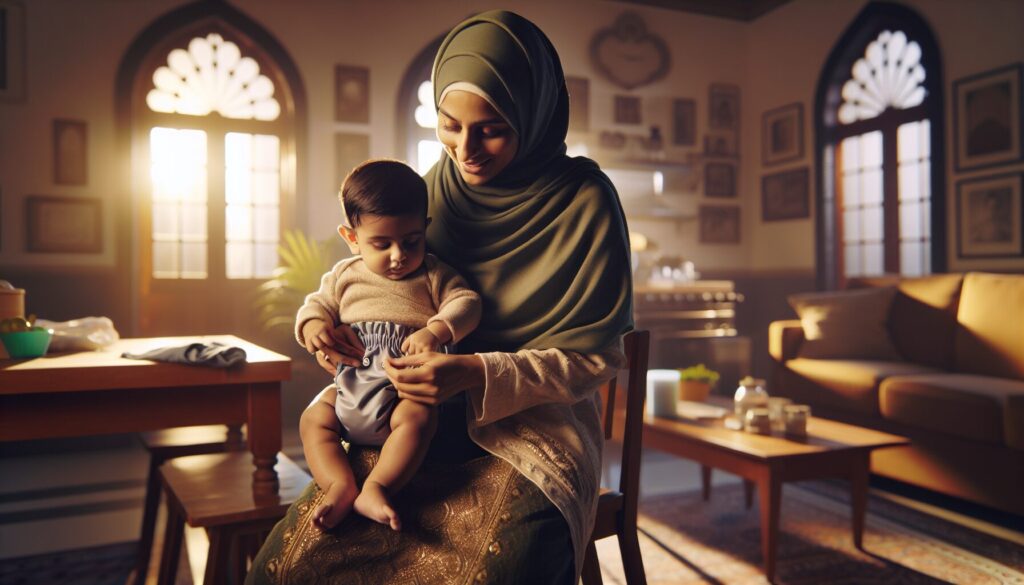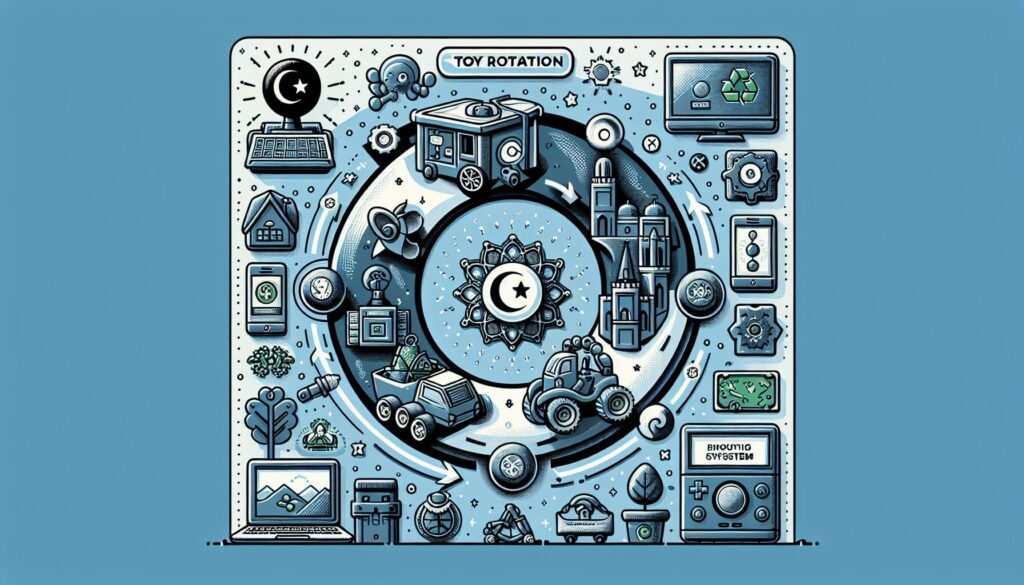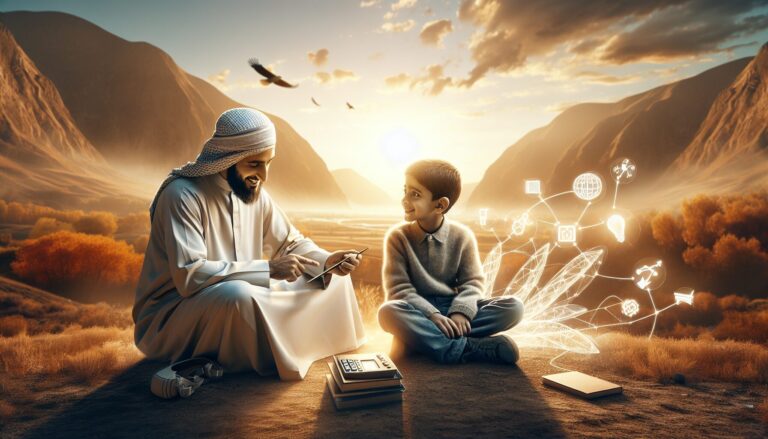Being a parent is like embarking on an exciting, unpredictable adventure, and incorporating eco-friendly practices along the way can make it even more rewarding! I remember when my little one first started crawling, and I realized how much I wanted to protect not just their tiny world but the larger one too. Eco-friendly parenting isn’t just about using cloth diapers or buying organic. It’s about making small, meaningful choices that benefit both our children and the planet. From choosing toys made of sustainable materials to making meals with locally sourced ingredients, it’s all about taking steps that align with our values. For Muslim parents, this aligns perfectly with our role as stewards (khalifah) of the Earth, a responsibility given to us by Allah. These choices, though sometimes tiny, add up and create a healthier, happier environment for our kids to grow up in.
1. Choose Cloth Diapers Over Disposables

Switching to cloth diapers is a fantastic way to embrace eco-friendly parenting. It might seem overwhelming at first, but trust me, it’s worth it. When my little one was born, I decided to give cloth diapers a try after a friend raved about them. At first, I was skeptical. But soon, I found they were not only better for the environment but also gentler on my baby’s skin.
Cloth diapers come with a host of benefits that make them a superior choice. First off, they’re reusable, which means you’re significantly reducing the amount of waste you send to landfills. This choice directly reflects the Islamic principle of avoiding wastefulness (israf), a value the Prophet Muhammad (peace be upon him) emphasized. Imagine the positive impact on our planet when you choose a sustainable option. Plus, in the long run, they can save you quite a bit of money. While the initial investment may seem high, think about how much you’ll save by not buying disposables every week!
Another huge advantage is the variety available. From all-in-one styles to prefolds, there’s a type of cloth diaper to suit every parent’s lifestyle. Personally, I found the all-in-one diapers to be a lifesaver. They’re as easy to use as disposables and come in adorable prints that make diaper changes a little more fun.
Tips for Making the Switch
Here are a few tips to make the transition smoother:
- Start Small: Begin with a few cloth diapers to see what works best for you and your baby.
- Research: Check out resources like Real Diaper Association or Cloth Diapering Foundation for guidance and support.
- Plan for Washing: Set a regular washing schedule to avoid pile-ups.
- Storage: Invest in a good diaper pail to keep things tidy and odor-free.
Additionally, consider joining a cloth diapering community. Groups like The Cloth Diaper Network provide fantastic support and tips from experienced parents. These communities are goldmines for troubleshooting any issues you might encounter.
With a little patience and practice, you’ll find that cloth diapering can seamlessly fit into your eco-friendly parenting routine. You’re not just making a choice for your baby, but also for our planet’s future. The small changes we make today can have a profound impact tomorrow. Let’s embrace this journey together and make our world a better place for our kids!
2. Opt for Second-Hand Clothing and Toys
Choosing second-hand clothing and toys is a smart and sustainable way to embrace eco-friendly parenting. It’s not just about saving money—though that’s a pretty sweet bonus—but also about reducing waste and teaching kids the value of resources. Embracing second-hand items teaches our children the beautiful Islamic values of humility and detachment from materialism (zuhd), showing that an item’s worth is in its usefulness, not its newness. When my little one was born, I discovered a whole world of thrift stores and online marketplaces where treasures awaited. You’d be amazed at the quality of items you can find, often gently used or even brand new.
When you’re opting for second-hand items, you’re not just making a choice for your wallet but for the planet. Every piece of clothing or toy you buy second-hand is one less item that needs to be manufactured, transported, and eventually discarded. This directly cuts down on the carbon footprint and waste associated with new products. Plus, your child still gets to enjoy a wide variety of clothes and toys without contributing to the cycle of overconsumption.
Here are a few places where you can find second-hand items:
- Thrift Stores: These are treasure troves for eco-friendly parents. Local thrift stores often have sections dedicated to children’s clothing and toys.
- Online Marketplaces: Websites and apps like eBay and Facebook Marketplace offer a plethora of options where you can shop from the comfort of your home.
- Community Swaps: Participating in a community swap can be a fun and rewarding experience. It’s a great way to meet other parents and trade items your child has outgrown for something new to them. Check out Freecycle Network for local swap events.
Benefits of Second-Hand Shopping
Second-hand shopping has several benefits that go beyond environmental impacts. Firstly, it instills a sense of appreciation in children. They learn to value the story behind each item, understanding that everything has a history and significance. Additionally, this approach encourages creativity; kids can mix and match outfits in unique ways and play with toys that might not be the latest trend but offer endless possibilities for imagination.
Furthermore, buying second-hand allows parents to provide for their children without breaking the bank. This can free up resources for other eco-friendly parenting tips, like investing in organic foods or supporting local, ethical brands. Plus, when you’re ready to pass on items your child no longer needs, you can donate them or participate in swaps, continuing the cycle of reuse.
For those raising environmentally conscious children, especially in diverse communities, exploring these options can be a great learning experience. It’s a fantastic way to connect with like-minded individuals and share tips on raising environmentally conscious children.
3. Embrace Homemade Baby Food
Embrace homemade baby food as a delightful and rewarding journey. Imagine whipping up a batch of colorful purees or adorable mini meals for your little one. Not only is this a great way to ensure your baby gets the freshest ingredients, but it’s also a wonderful step towards eco-friendly parenting tips. Plus, it can be surprisingly easy and fun!
First off, the benefits are fantastic. Making baby food at home means you control exactly what goes into it. This practice connects us to the Quranic concept of consuming foods that are pure and wholesome (tayyib), ensuring we are providing the best, most natural nourishment for our children. You can choose organic produce from your local farmer’s market or grocery store. This not only supports sustainable agriculture but is also better for the planet. Moreover, you can experiment with a variety of fruits and vegetables. Try mixing sweet potatoes with apples or peas with pears for a sweet twist.
Steps to Get Started
To kick things off, you’ll need some basic tools:
- A good blender or food processor
- Steamer basket or pot for cooking
- Storage containers or ice cube trays for freezing
Begin by washing and peeling your chosen fruits or veggies. Steam or boil them until tender. Once cooked, blend them into a smooth puree. Add a little cooking water if necessary to reach the desired consistency. For storage, pour the puree into ice cube trays. Freeze them, then transfer the cubes into storage bags or containers. This way, you can easily defrost small portions as needed.
Safety is paramount when preparing homemade baby food. Always ensure that all utensils and surfaces are clean. Be mindful of potential allergens, introducing them one at a time. Remember to consult your pediatrician for personalized advice. The American Academy of Pediatrics offers great guidance on introducing solids.
Additionally, homemade baby food reduces waste. You can use up leftover fruits and veggies before they spoil. This reduces the need for packaged baby foods, which often come in single-use containers. The Environmental Working Group has excellent resources on how to choose the cleanest produce.
Embracing homemade baby food isn’t just about nourishment. It’s about creating a special bond with your baby as you explore new flavors together. Plus, it sets a solid foundation for a lifetime of healthy eating habits. So grab your apron, have fun, and enjoy the delicious journey of homemade baby food!
4. Use Eco-Friendly Cleaning Products
When you’re setting out on the journey of eco-friendly parenting, one of the easiest changes to make is switching to eco-friendly cleaning products. And trust me, it’s not just about saving the planet; it’s also about creating a safer, healthier environment for your little ones. Using natural ingredients aligns with the deep Islamic emphasis on cleanliness and purity (tahara), not just in our bodies for worship, but in our homes as well. You’d be amazed at how many harmful chemicals lurk in conventional cleaning products, and these can be especially concerning if you have crawling babies or curious toddlers who like to touch and taste everything.
Now, let’s talk about what makes a cleaning product eco-friendly. Essentially, these products are formulated using natural ingredients that are biodegradable and non-toxic, which means they break down easily in the environment and won’t harm your family. However, not all products that claim to be “natural” are created equal, so looking for certifications from organizations like Environmental Working Group or Green Seal can be incredibly helpful. These certifications ensure that the products meet strict environmental and health standards.
Swapping out your standard cleaning supplies with eco-friendly options can be easier than you think. Here are a few steps to get you started:
- Replace your all-purpose cleaner with one that’s plant-based and free from synthetic fragrances.
- Use vinegar and baking soda for a powerful yet gentle scrub suitable for many surfaces.
- Switch to biodegradable dish soaps and laundry detergents that are free from harsh chemicals.
Additionally, many of these products come in concentrated forms, which means less packaging waste. Some companies even offer refill stations, so you can reuse your containers, reducing plastic waste even further. It’s a small change, but it makes a big difference.
One personal favorite of mine is making my own cleaning solutions. You can do wonders with a simple mix of vinegar, water, and essential oils like lavender or tea tree oil. Not only do they effectively clean, but they also leave a refreshing scent without the use of artificial fragrances.
When you choose eco-friendly cleaning products, you’re not just taking a step towards sustainability; you’re embracing a lifestyle that’s mindful of the world your children will grow up in. It’s one of those eco-friendly parenting tips that feels rewarding on multiple levels. Plus, teaching your kids about these choices can plant the seeds for a lifetime of environmental awareness. So go ahead and make that switch—your home, your family, and the planet will thank you for it.
5. Implement a Toy Rotation System

Implementing a toy rotation system can be a game-changer for both your kids and your sanity. Imagine having fewer toys scattered around the house, yet your little ones are still as entertained as ever. Sounds dreamy, right? Let’s dive into how this brilliant system works and why it’s a must-try for anyone embracing eco-friendly parenting tips.
Rotating toys is about keeping a portion of your child’s toys accessible while storing the rest. Every few weeks, you swap them out. This approach works wonders because children often forget about toys they haven’t seen in a while, making them feel new and exciting again. It’s like having a mini Christmas morning every month!
First, sort through the toys and categorize them. Think about grouping them by type or activity. For instance, you might organize them into categories like puzzles, building blocks, art supplies, and pretend play. This makes it easier to mix and match different kinds of toys when it’s time to rotate.
Next, create a schedule for rotating the toys. You might choose to rotate every two weeks or once a month. It depends on what works best for you and how quickly your child loses interest. Keep a few favorites out all the time for comfort and familiarity. However, be sure to switch things up regularly to keep the playtime fresh and engaging.
Here’s where eco-friendly parenting comes in. By rotating toys, you’re effectively reducing the need to buy new ones. This means less waste and fewer resources used in production and transportation. It’s a simple yet impactful step toward sustainability.
Benefits of a Toy Rotation System
- Encourages Creativity: With fewer toys, kids often use their imagination to explore new ways of playing.
- Reduces Clutter: A less cluttered space makes it easier to clean up and organize.
- Saves Money: Less impulse buying of new toys reduces expenses.
- Focuses Attention: With fewer choices, children may focus better on each toy.
Consider connecting with communities and resources like Freecycle Network or Goodwill for recycling or donating toys your kids have outgrown. Not only does this help in decluttering, but it also encourages a culture of sharing and sustainability.
Remember that a toy rotation system doesn’t have to be rigid. Adjust it to fit your family’s needs and lifestyle. This flexible approach not only supports eco-friendly parenting but also nurtures your child’s development in a thoughtful and sustainable way.
6. Encourage Outdoor Play with Nature
Encouraging outdoor play with nature is a fantastic way to embrace eco-friendly parenting. Kids naturally have a sense of wonder, and what better classroom than the great outdoors? This is a form of worship in itself. Encouraging our children to observe the beauty of the natural world is a way to practice tafakkur, or reflection upon Allah’s magnificent creation. You know, one of my fondest memories is of my little one discovering a butterfly for the first time. Her eyes lit up as she followed its fluttering path, completely mesmerized. It’s moments like these that make you appreciate the simple beauty of nature.
When you’re planning your child’s outdoor adventures, consider exploring local parks and nature reserves. Many areas have hidden gems perfect for family outings. Check with organizations like National Park Service or Nature Conservancy for trails and parks near you. These places not only offer a wealth of learning opportunities but also instill a love for preserving our planet.
Here’s why outdoor play is so powerful for eco-friendly parenting:
- Environmental Awareness: Being immersed in nature helps kids appreciate the environment, fostering a sense of responsibility to protect it.
- Physical Health: Outdoor activities like hiking, running, or biking encourage physical fitness, essential for children’s growth.
- Mental Well-being: Nature has a calming effect, reducing stress and anxiety while boosting creativity and imagination.
Additionally, consider organizing small projects like planting a mini garden or starting a compost pile. These hands-on activities teach kids about sustainable living and the cycle of life. Plus, they get to see the fruits of their labor, quite literally! A child who plants a seed and watches it grow into a thriving plant learns patience and responsibility.
Creative Outdoor Activities
Incorporating creativity into outdoor play can be incredibly rewarding. Encourage children to collect rocks, leaves, or sticks to create art projects. Not only does this spark creativity, but it also minimizes waste by using natural materials. You might even want to join local groups like Leave No Trace Center for Outdoor Ethics to learn more about sustainable outdoor practices.
Remember, the goal is to make nature enjoyable and educational. By doing so, you’re not only nurturing your child’s development but also embedding lifelong eco-friendly habits. These experiences will undoubtedly leave a lasting impression on your kids, inspiring them to be conscious stewards of the earth.
7. Teach Kids About Recycling and Composting
Getting kids involved in recycling and composting can be a real game-changer for eco-friendly parenting. Imagine the little ones becoming little eco-warriors right before your eyes! It’s not just about tossing things into the right bin or setting up a compost pile; it’s about teaching them lifelong habits that benefit both the earth and their understanding of resourcefulness.
Start by making recycling fun and accessible. Set up clearly labeled bins at home. Use bright colors or even pictures to help them quickly figure out what goes where. Kids love a good challenge, so why not turn it into a game? Challenge them to find the right bin for their yogurt cup or cereal box. A friendly competition could even be in order! Furthermore, consider a visit to your local recycling facility to show them the journey their recyclables take. Many places, like the National Recycling Coalition, offer tours that can be both educational and exciting.
Composting can be equally engaging. Begin by explaining how composting turns “trash” into treasure for the garden. Kids are naturally curious, so letting them help set up a small compost bin can spark their interest. Have a mini science lesson by showing them how food scraps break down over time. If you have space, a worm composting system can be fascinating for children, as they get to see nature in action. The US Composting Council has great resources to get started with composting.
Hands-On Activities
Integrate some hands-on activities to reinforce these concepts. Host a craft day using recycled materials. Kids can create art from old newspapers and magazines or build models from cardboard boxes. These activities teach them that recycling isn’t just about reducing waste but also about creating new things from old ones.
Another engaging activity is setting up a small garden where kids can use the compost they’ve helped make. Watching plants grow can be incredibly rewarding and reinforces the benefits of composting. Plus, it’s a perfect way to introduce them to the joys of gardening and sustainability.
Involve them in community activities. Many communities have recycling drives or clean-up days organized by groups like Keep America Beautiful. Participating in these events can instill a sense of pride and responsibility in children. They’ll see firsthand the impact they can have on their environment.
By teaching kids about recycling and composting, you’re not only giving them valuable eco-friendly parenting tips but also equipping them with skills and knowledge they’ll carry into adulthood. It’s a beautiful way to nurture their curiosity and help them grow into conscientious global citizens.
Conclusion
To sum up, eco-friendly parenting is a journey filled with small, meaningful choices that collectively make a significant impact on our children’s futures and the planet. By embracing practices like cloth diapering, second-hand shopping, homemade baby food, and outdoor play, parents can foster a nurturing environment that instills lifelong habits of sustainability and environmental consciousness in their children. As these practices become second nature, they not only benefit the planet but also enrich family life with creativity, savings, and deeper connections to nature. Here’s to raising a generation of eco-conscious kids!
Continue Exploring
Ready to experience Eid like never before? Discover the vibrant and unforgettable celebrations happening across New Zealand. From dazzling cultural performances to sumptuous feasts, see where you can immerse yourself in the spirit of Eid.
Frequently Asked Questions
Why should I choose cloth diapers over disposable ones?
Cloth diapers are a more eco-friendly option as they are reusable and significantly reduce waste sent to landfills. They are also gentler on your baby’s skin and can save you money in the long run, despite the higher initial investment.
How can I start making homemade baby food and what are the benefits?
To start making homemade baby food, you’ll need basic tools like a blender, steamer, and storage containers. The benefits include controlling the ingredients, supporting sustainable agriculture by choosing organic produce, and reducing waste from packaged baby foods.
What are the benefits of encouraging outdoor play with nature for my child?
Outdoor play helps children develop environmental awareness, physical health, and mental well-being. It fosters a love for nature, encourages creativity, and teaches them about sustainability through hands-on activities like gardening and composting.
Fatima Ansari is an Islamic educator and writer with over a decade of experience teaching Quran and Islamic studies to children and families in Western Muslim communities. Growing up in North America, she saw firsthand the challenges Muslim families face in balancing faith with modern life, which inspired her to share practical guidance rooted in the Quran and Sunnah. Her mission with E-Quran Learning is to make Islamic education accessible, relatable, and inspiring for Muslim families across the United States, United Kingdom, Canada, Australia, and New Zealand.






